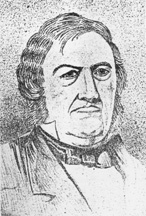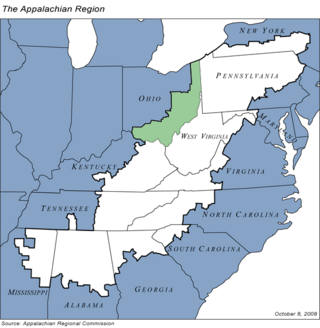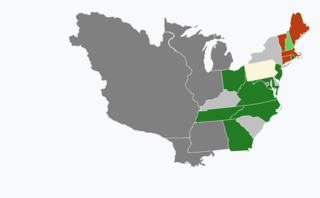
The Ohio General Assembly is the state legislature of the U.S. state of Ohio. It consists of the 99-member Ohio House of Representatives and the 33-member Ohio Senate. Both houses of the General Assembly meet at the Ohio Statehouse in Columbus.

Thomas Morris was an American politician from Ohio who served in the United States Senate and was a member of the Democratic Party. In the 1844 presidential election, he was the vice presidential nominee of the anti-slavery Liberty Party.

This is a list of high school athletic conferences in Ohio, separated by Ohio High School Athletic Association (OHSAA) region. Some conferences have schools in multiple regions, and will be listed in all applicable regions. However, the conference information is on the region page where the most schools are classified in.
Ohio's 6th congressional district is a U.S. congressional district which is represented by Representative Michael Rulli of the Republican Party. Rulli was elected to the seat after he defeated Democrat Michael Kripchak in the June 11, 2024 special election, caused by the resignation of incumbent Bill Johnson (R) on January 21, 2024.
Green Township, Ohio may refer to the following places in the U.S. state of Ohio:
Philemon Beecher was an Anglo-American attorney and legislator who was a member of the United States House of Representatives from Ohio.

Appalachian Ohio is a bioregion and political unit in the southeastern part of the U.S. state of Ohio, characterized by the western foothills of the Appalachian Mountains and the Appalachian Plateau. The Appalachian Regional Commission defines the region as consisting of thirty-two counties. This region roughly overlaps with the Appalachian mixed-mesophytic forests, which begin in southeast Ohio and southwest Pennsylvania and continue south to Georgia and Alabama. The mixed-mesophytic forest is found only in Central and Southern Appalachia and eastern/central China. It is one of the most biodiverse temperate forests in the world.

Robert Walker Tayler Sr. was a Republican politician in the U.S. State of Ohio who was a member of the Ohio Senate and was Ohio State Auditor 1860–1863.

Isaac B. Cameron was a Republican politician in the U.S. state of Ohio who was Ohio State Treasurer from 1900 to 1904.

The 2000 United States presidential election in Ohio took place on November 7, 2000, and was part of the 2000 United States presidential election. Voters chose 21 representatives, or electors to the Electoral College, who voted for president and vice president.
The electoral history of each district in the Ohio House of Representatives can be traced from 1966 to the present.
Terry A. Johnson is an American politician serving as a Republican member of the Ohio Senate from the 14th District. He is an osteopathic physician who was a member of the Ohio House of Representatives for the 90th district from 2011 to 2018.

The 1996 United States presidential election in Ohio took place on November 5, 1996. All 50 states and the District of Columbia, were part of the 1996 United States presidential election. State voters chose 21 electors to the Electoral College, which selected the president and vice president.
Thomas Quin Ashburn was an American judge on the Supreme Court Commission of Ohio from 1876 to 1879, and a member of the Ohio State Senate for twelve days at the end of his life in 1890.

The First Ohio General Assembly was the initial meeting of the Ohio state legislature, composed of the Ohio State Senate and the Ohio House of Representatives. It convened in Chillicothe, Ohio, on March 1, 1803, and adjourned April 16, 1803. This General Assembly coincided with the first year of Edward Tiffin's first term as Ohio Governor.
Since the OHSAA began basketball competition in 1922–23, many schools have decided to band together in conferences to help scheduling, added competition for titles and bragging rights, and oftentimes help determine seeding for the early rounds of the state tournament. Some conferences had been established for football-playing schools, and as schools added other sports, adopted those under the conference banner once enough schools started playing. Smaller schools often picked up basketball first, adding other sports later, and combined with other in-county schools to form County conferences. Most of these leagues were formed in the 1920s and early 1930s after the tournament was started, which is why quite a few lack a definitive starting date at this point in time.

The 1968 United States presidential election in Ohio took place on November 5, 1968. All 50 states and The District of Columbia were part of the 1968 United States presidential election. Ohio voters chose 26 electors to the Electoral College, who voted for president and vice president.

The 1964 United States presidential election in Ohio was held on November 3, 1964, as part of the 1964 United States presidential election. Voters chose 26 representatives, or electors, to the Electoral College, who voted for President and Vice President.

United States gubernatorial elections were held in 1805, in 13 states.












